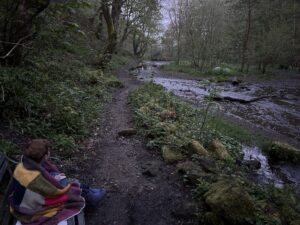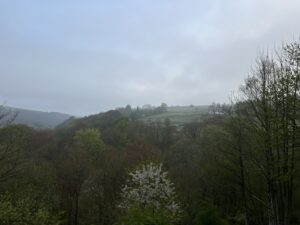Embarking on a pre-5am adventure, Amy Liptrot and son take to the woods in pursuit of Britain’s biggest wildlife miracle.

I’ve been thinking about how ‘adventure’ doesn’t have to mean travelling, it can simply be experiencing your usual environment in a different way.
I set my alarm for 4.30am and, after dressing and checking it is dry outside, I wake my 5 year old son, as we have planned. He doesn’t protest, getting up with focus like a soldier on mission. I make a flask of hot chocolate, put a few things in a bag, and we’re out and into the woods by 5am.
The birds are already singing loudly. My identification skills stretch to blackbird and robin but there are plenty of others. The beginning of May is when the dawn chorus peaks, male birds singing to defend their territories and proclaim themselves.
In the depth of the woods, I wrap him in a blanket and pour the hot chocolate. We sit in silence and listen for a while. Close by, at least one wren is trilling loudly. In the background wood pigeons are cooing. There is a rattle above our heads and we watch a silhouette of a mid-size bird which I later identify by its alarm call as a mistle thrush. Some kind of bird of prey — a kestrel or sparrowhawk I guess — cries and I glimpse it flying overhead. My son gets excited and tells me he saw it land in a tree: “a vulture” he says.
We go to check on our owl box which sadly does not seem occupied, hearing a song thrush on the way. We climb up out of the wood and a curlew’s call carries down from the moor. I’d hoped we might watch the sun rising together but the sky is veiled, there is simply a slow brightening of the mist (“Mummy, it’s getting quite lighter”).

Across the field, we see a deer, a wild animal quietly grazing. Then the deer sees us and there are a few seconds where we both look at each other before it bounds away. We walk back into town, a few cars on the road now, curtains opening, the bin lorry, and a sense of coming back into civilisation.
Naturalist Simon Barnes calls the dawn chorus ‘the single biggest wildlife miracle we have in Britain’, so it’s definitely worth the tiredness of later in the day. I am urgently aware that the richness of this time might well have diminished by the time my kid is older, and I hope he will remember this morning.
When we get home, sometime after 6am, the other members of the household are still asleep but we’ve had an adventure. There are pancakes for breakfast and a bright May day ahead.
*
Tomorrow is International Dawn Chorus Day. Visit the RSPB website for tips on celebrating on your doorstep, at your local nature reserve, or online.